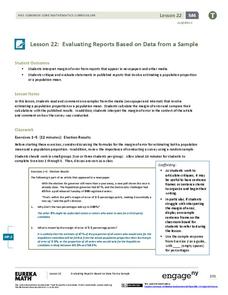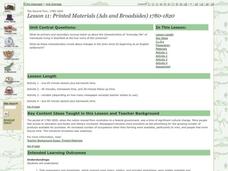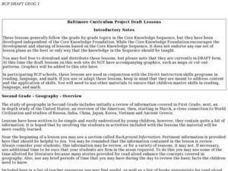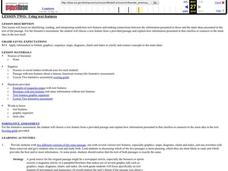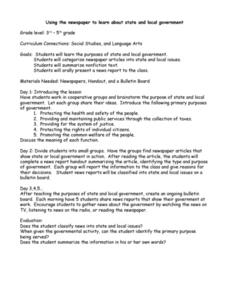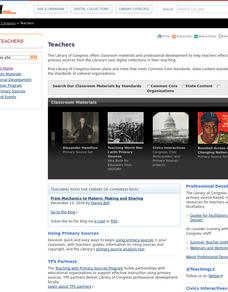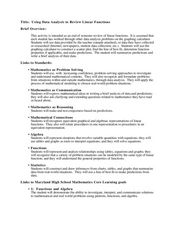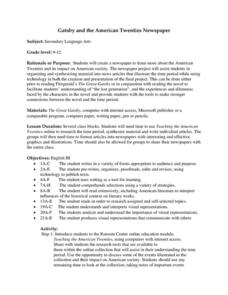Curated OER
Nonfiction Genre Mini-Unit: Persuasive Writing
Should primary graders have their own computers? Should animals be kept in captivity? Young writers learn how to develop and support a claim in this short unit on persuasive writing.
Curated OER
A Colony is Born : Lesson 5 - Dear Mem
Discover colonies! Young historians will listen to a primary source journal entry read aloud with a backdrop of wave sounds. They discuss the entry, add historical facts to a chart and personal insights to another. Then they listen to...
EngageNY
Evaluating Reports Based on Data from a Sample
Statistics can be manipulated to say what you want them to say. Teach your classes to be wise consumers and sort through the bias in those reports. Young statisticians study different statistical reports and analyze them for misleading...
Gilder Lehrman Institute of American History
Harriet Beecher Stowe Sends Uncle Tom’s Cabin to Victoria and Albert, 1852
Harriet Beecher Stowe's plea for abolition is not only laid plain in her acclaimed novel, Uncle Tom's Cabin, but in her written correspondence as well. High schoolers read a letter written by Stowe to Prince Albert and Queen Victoria to...
PBS
Who Knows Best
Finding an expert in a given field when conducting research can be a challenge. This guide provides step-by-step directions as well as links to resources that help young sleuths find the authorities and experts they need. As a bonus, two...
Curated OER
Digestive System, a Kinesthetic Lesson
Students actively act out an aspect of the digestive tract on two parallel strips of tape on the floor 3-4 feet apart and width of classroom which represent the digestive tract.
Curated OER
ADULT ESOL LESSON PLAN--Communicate Effectively on Health and Nutrition Topics
Students, while reviewing an extensive vocabulary list on the board, identify basic food groups with the help of picture cards. As a group, they create a collage of healthy and unhealthy foods using pictures from magazines and newspapers.
Curated OER
Lesson 11: Printed Materials (Ads and Broadsides) 1780-1820
Students use primary resources (gazettes, broadsides, advertisements) to consider life at the turn of the 18th century in Deerfield, Massachusetts. They infer observations about life in the nascent United States.
Curated OER
Inuit Lesson
Students investigate the Inuit People. For this Inuit lesson, students locate where they live on a map, outline their history and describe their lifestyle. Students play Inuit games, practice using the Inuit alphabet and examine the...
Curated OER
Teenage Boys: Perspectives on the Adolescent Male's Development in an Urban Setting
Students examine the effects of an urban setting on the development of male adolescence. After watching a film, they identify the problems in the relationship of the characters. They discuss the impact of becoming a teenage father and...
Curated OER
Clay Personality Boxes Lesson Plan
Students create cut slab boxes from clay using the slip and scoring technique. They impress a surface texture into the clay. Students decorate their box to represent themselves in some way.
Curated OER
Spotlight On Stem Cells
Students discover the differences in how stem cells develop and function depending on their source. They see how scientists are using stem cells - from a variety of sources - to study how they can be used to cure certain illnesses and...
Curated OER
Geography Lesson 1
Middle schoolers examine relationship between population centers and sports teams, explore influence of weather on attendance, and research influence of geography, traffic flow and disposable income on site selection for sports stadiums.
Curated OER
Using Text Features
Fourth graders read a nonfiction story that is presented to them with graphic features, and presented to them with only the text. In this text features lesson, 4th graders decide what the benefits of text organizers are and create their...
Curated OER
Your Angle on the Story
Students review several articles on same current event, and then cover news issues themselves while assuming secret identities of various individuals who have vested interests in issue. Students write newspaper articles from these...
Curated OER
A Valid Conclusion? Testing and Reporting on Hypotheses Using the Scientific Method
Students explore importance of accuracy in reporting, focusing particularly on articles documenting scientific discoveries, and practice scientific method by conducting experiments to test and report on scientific hypotheses.
Curated OER
Using the newspaper to learn about state and local government
Students investigate the purposes of state and local government. They categorize newspaper articles into state and local issues. Pupils summarize nonfiction text. Students given an oral presentation on a news report to the class.
Curated OER
The Mass Media and Politics
What effect do the prevalence of televisions in homes have on the American political stage? Challenge your students to consider this idea with these ten questions, both true/false and multiple choice. You could use this activity as a...
Curated OER
When Work is Done
Eleventh graders create an album based on a thesis statement about life in the 20th century after completing the introductory lesson for a lesson on the web site "When Work is Done".
Curated OER
Where's King Solomon when we need him?: Good decisions on resources
Students use geographic information to suggest how to manage natural resources through a simulation. They engage in a simulation, and decide how to protect, allocate, and exploit the resources of a hypothetical location.
Curated OER
ESL: Practice Using Present Progressive Tense
Small, cartoonish pictures of people expressing emotions and actions (blowing his nose, holding her head and frowning, dancing, smiling) provide the basis for writers to describe the feelings and experiences taking place. Help your ESL...
Curated OER
Using Data Analysis to Review Linear Functions
Using either data provided or data that has been collected, young mathematicians graph linear functions to best fit their scatterplot. They also analyze their data and make predicitons based on the data. This lesson is intended as a...
Curated OER
Report on a Reporter
Students listen as a local reporter visits their classroom. They write them a thank you note and develop their own questions to ask them. They practice using proper sentence structure and grammar.
Curated OER
Gatsby and the American Twenties Newspaper
High schoolers research 1920's US History. In this historical literature lesson, students use the novel The Great Gatsby as a tool to examine the era. They work in individually to create newspaper articles based on different historical...




